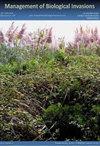Establishing the Aedes watch out network, the first island-wide mosquito citizen-science initiative in Cyprus within the framework of the Mosquitoes Without Borders project
IF 1.2
4区 环境科学与生态学
Q3 BIODIVERSITY CONSERVATION
引用次数: 1
Abstract
Recent outbreaks of Zika, chikungunya and dengue fever worldwide highlight the importance of understanding the spread of pathogen-carrying mosquitoes. Citizen or community science initiatives can contribute towards early warning rapid response systems and complement at spatial and temporal scales traditional mosquito surveillance which often relies on limited resources. Herein, we provide information regarding a first attempt of involving citizens in mosquito monitoring on the island of Cyprus. During the 2018–2019 season, an island wide network of citizen scientists was formed as part of The Three Mosquiteers initiative and the Mosquitoes Without Borders project that aims at educating and engaging citizens of all ages regarding mosquitoes. The new network was named Aedes Watch Out and it aims to provide information on island wide mosquito presence overcoming jurisdictional barriers and cost constraints. Aedes Watch Out aims to serve as an early warning information source about the non-native Asian tiger mosquito ( Aedes albopictus ) arrival to Cyprus, complementing current capacities and any work that the authorities undertake. The initial outcomes of the project demonstrate that even a small number of dedicated citizen scientists can generate important information and greatly facilitate experts in entomology and public health.建立伊蚊监测网络,这是塞浦路斯在蚊子无国界项目框架内的第一个全岛蚊子公民科学倡议
最近在世界范围内爆发的寨卡病毒、基孔肯雅热和登革热突出了了解携带病原体的蚊子传播的重要性。公民或社区科学倡议可以促进早期预警快速反应系统,并在空间和时间尺度上补充往往依赖有限资源的传统蚊子监测。在此,我们提供关于让公民参与塞浦路斯岛蚊子监测的首次尝试的信息。在2018-2019年期间,作为“三个蚊子”倡议和“蚊子无国界”项目的一部分,一个全岛范围的公民科学家网络成立了,旨在对所有年龄段的公民进行蚊子教育和参与。新的网络被命名为“伊蚊监视”,其目的是克服司法障碍和成本限制,提供全岛蚊子存在情况的信息。伊蚊监测旨在作为非本地亚洲虎蚊(白纹伊蚊)抵达塞浦路斯的预警信息来源,补充当局目前的能力和开展的任何工作。该项目的初步成果表明,即使是少数热心的公民科学家也能产生重要的信息,并极大地促进昆虫学和公共卫生方面的专家。
本文章由计算机程序翻译,如有差异,请以英文原文为准。
求助全文
约1分钟内获得全文
求助全文
来源期刊

Management of Biological Invasions
Agricultural and Biological Sciences-Ecology, Evolution, Behavior and Systematics
CiteScore
3.40
自引率
6.70%
发文量
21
审稿时长
16 weeks
期刊介绍:
Management of Biological Invasions, established in 2010 by Dr. Elias Dana, is an open access, peer-reviewed international journal focusing on applied research in biological invasions in aquatic and terrestrial ecosystems from around the world. This journal is devoted to bridging the gap between scientific research and the use of science in decision-making, regulation and management in the area of invasive species introduction and biodiversity conservation.
Managing biological invasions is a crisis science, with Management of Biological Invasions aiming to provide insights to the issues, to document new forms of detection, measurements and analysis, and to document tangible solutions to this problem.
In addition to original research on applied issues, Management of Biological Invasions publishes technical reports on new management technologies of invasive species and also the proceedings of relevant international meetings. As a platform to encourage informed discussion on matters of national and international importance, we publish viewpoint papers that highlight emerging issues, showcase initiatives, and present opinions of leading researchers.
 求助内容:
求助内容: 应助结果提醒方式:
应助结果提醒方式:


